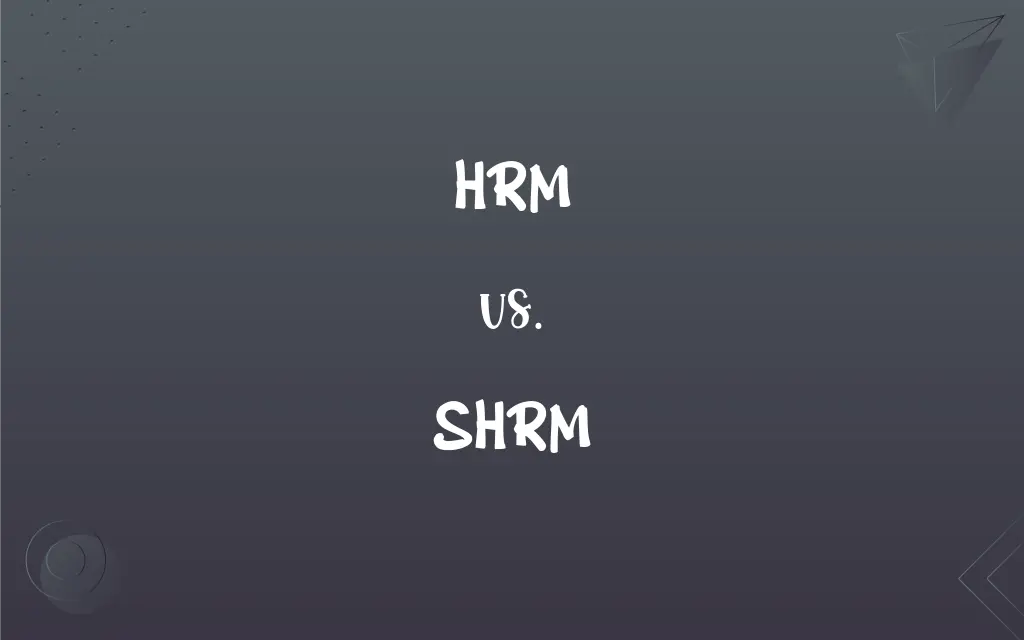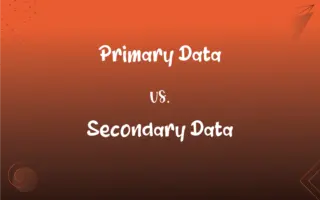HRM vs. SHRM: What's the Difference?
Edited by Aimie Carlson || By Harlon Moss || Updated on October 4, 2023
HRM (Human Resource Management) focuses on managing individual employees, while SHRM (Strategic Human Resource Management) integrates HRM with the overall strategy of the organization.

Key Differences
HRM primarily concerns itself with the management of people within an organization, including hiring, training, and compensation. SHRM, on the other hand, takes a broader approach, aligning human resource strategies with the overall business strategy to enhance organizational performance.
HRM is about recruitment, employee welfare, and individual performance metrics. SHRM incorporates these elements but extends its focus to ensuring the HR strategy supports the long-term goals and vision of the company.
HRM seeks to improve the efficiency and productivity of employees on a day-to-day basis. SHRM, conversely, is future-oriented, aiming to foresee the human resource implications of future business strategies and planning accordingly.
HRM often works in silos, handling issues like recruitment, compensation, and training separately. SHRM adopts a more holistic approach, integrating all HR-related activities to ensure they're in line with the company's strategic objectives.
In HRM, decisions are often reactive, responding to immediate needs or issues. In SHRM, decisions are proactive, anticipating future challenges and aligning HR practices with business goals.
ADVERTISEMENT
Comparison Chart
Focus
Manages individual employees
Integrates HRM with organizational strategy
Scope
Day-to-day operations
Long-term planning
Decision-making
Reactive
Proactive
Integration
Often works in silos
Holistically integrates HR activities
Outcome
Employee efficiency and productivity
Enhancement of organizational performance
ADVERTISEMENT
HRM and SHRM Definitions
HRM
An organizational approach to ensure the best use and management of its human resources.
The effectiveness of HRM can directly impact an organization's success.
SHRM
The practice of aligning HR policies and practices with business strategies.
By adopting SHRM, the company ensures that its human resources contribute to its strategic goals.
HRM
The process of managing people in organizations in a structured manner.
The company's HRM department is responsible for hiring new talent.
SHRM
A systematic and strategic approach to managing an organization's most valuable asset: its people.
SHRM recognizes the significance of human capital in achieving organizational objectives.
HRM
The system of practices and policies to optimize the human capital of an organization.
Proper HRM can lead to increased productivity and morale.
SHRM
A proactive approach to foreseeing the human resource implications of a company's strategy.
SHRM ensures that HR practices are aligned with business growth.
HRM
A function that deals with recruitment, training, and compensation of employees.
HRM plays a crucial role in ensuring employee satisfaction and retention.
SHRM
The integration of HR strategies with the strategic goals and objectives of the organization.
The company's SHRM approach helps in long-term sustainability.
HRM
The discipline concerned with the management of individuals within a company.
Good HRM practices are essential for a company's growth and reputation.
SHRM
The process of connecting the human resource function with the strategic objectives of an organization.
Through SHRM, HR decisions directly support the company's mission.
FAQs
Is HRM reactive or proactive?
HRM is generally reactive, addressing immediate needs or issues.
Is SHRM future-oriented?
Yes, SHRM is future-oriented, aiming to foresee HR implications of future strategies.
Which requires more integration, HRM or SHRM?
SHRM requires more integration as it aligns HR activities with business goals.
How does SHRM differ from HRM?
SHRM integrates HRM with the overall strategy of the organization.
What is the key advantage of SHRM?
SHRM enhances organizational performance by aligning HR strategies with business strategies.
Does HRM involve long-term planning?
Typically, HRM is more focused on day-to-day operations than long-term planning.
Are HRM and SHRM mutually exclusive?
No, SHRM can encompass traditional HRM practices but adds a strategic dimension.
What is the main focus of HRM?
HRM focuses on managing individual employees, including hiring, training, and compensation.
What does SHRM stand for?
SHRM stands for Strategic Human Resource Management.
What kind of approach does SHRM take?
SHRM is proactive, aligning HR practices with future business goals.
Can a company have both HRM and SHRM?
Yes, many companies integrate traditional HRM practices with strategic considerations (SHRM).
How does HRM handle employee concerns?
HRM addresses concerns on an individual basis, focusing on day-to-day operations.
What's the outcome focus of SHRM?
SHRM aims to enhance overall organizational performance.
Why is HRM important?
HRM ensures the effective management and utilization of an organization's human resources.
How does SHRM view employee concerns?
SHRM considers employee concerns in the context of broader organizational strategies.
Does SHRM work in silos?
No, SHRM adopts a holistic approach, integrating all HR-related activities.
What does HRM stand for?
HRM stands for Human Resource Management.
How does HRM affect employee productivity?
HRM aims to improve employee efficiency and productivity on a day-to-day basis.
Which is broader in scope, HRM or SHRM?
SHRM has a broader scope as it integrates HRM with the organization's overall strategy.
Are HRM decisions often siloed?
Yes, HRM often addresses issues like recruitment, training, and compensation separately.
About Author
Written by
Harlon MossHarlon is a seasoned quality moderator and accomplished content writer for Difference Wiki. An alumnus of the prestigious University of California, he earned his degree in Computer Science. Leveraging his academic background, Harlon brings a meticulous and informed perspective to his work, ensuring content accuracy and excellence.
Edited by
Aimie CarlsonAimie Carlson, holding a master's degree in English literature, is a fervent English language enthusiast. She lends her writing talents to Difference Wiki, a prominent website that specializes in comparisons, offering readers insightful analyses that both captivate and inform.































































